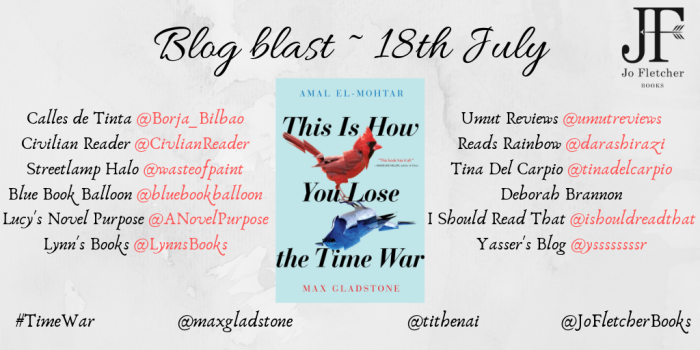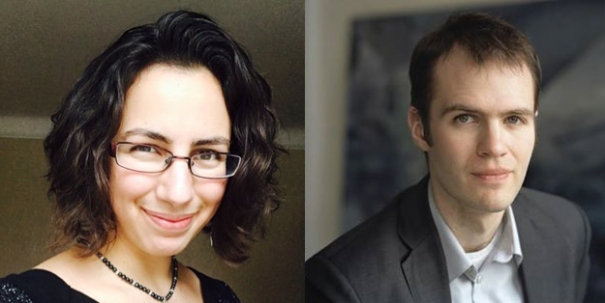
Let’s start with an introduction: Who are Amal El-Mohtar and Max Gladstone?
AE: Two sentient beings, both alike in dignity, in fair EssEffEff, where we set our — wait maybe that’s too zoomed out. Let’s see. Max is a brilliant superhuman writer, author of The Craft Sequence books (at six and counting!), just-released standalone space opera The Empress of Forever, and head writer of Serial Box’s Bookburners.
MG: And Amal is a world-renowned and award-winning writer, editor, scholar, NYT-published critic, and general badass — her phenomenal “Seasons of Glass and Iron” won the Hugo, Nebula, and Locus awards!
This is How You Lose the Time War, a novel you have written together, will be published in July. It looks really interesting: How would you introduce it to a potential reader?
AE: It’s an epistolary spy vs. spy novella across time and space; think Griffin and Sabine meets Killing Eve by way of Steven Universe. Alternately, imagine if Florence + the Machine’s Lungs was a novella in which all the songs are sung to women in letter-form.
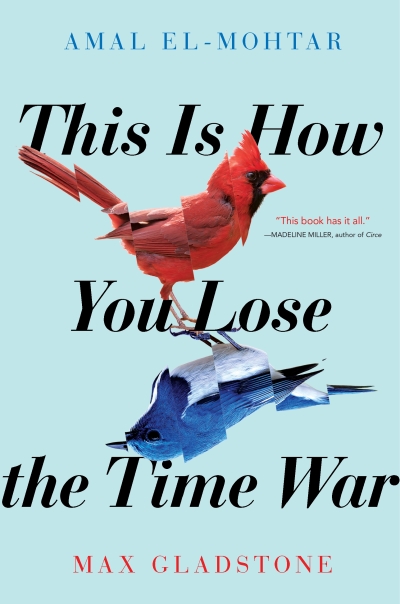
What inspired you to write the novel? And where do you draw your inspiration from in general?
AE: We were inspired, first and foremost, by how much we liked each other and our respective writing! First we read each other’s work, then we became friends, then we started writing each other letters, then we became better friends, then we said we should really collaborate on something together, and decided that a novella was roughly the right length for us to experiment with pairing our different voices and attempting to blend them into weird harmonies.
MG: It was really important to both of us that the project be flexible enough to allow both of us to play around. It’s so easy in collaboration to circumscribe the work so it becomes the overlap of the two writers’ styles, rather than their sum. We wanted to be able to bring all our powers to bear. So we needed a setting broad enough to allow both imaginations full rein.
How were you introduced to genre fiction?
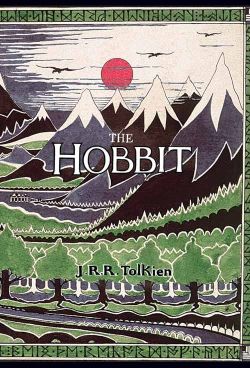 AE: I’d been reading fairy tales since I was very small, but I read The Hobbit when I was seven and found it life-changing. I learned the poems in it by heart and made up music for them and wanted to live in Middle-Earth. Around the same age I started reading Doctor Who novelisations, not realizing they were based on a TV show… And wouldn’t realize that until the Eccleston reboot.
AE: I’d been reading fairy tales since I was very small, but I read The Hobbit when I was seven and found it life-changing. I learned the poems in it by heart and made up music for them and wanted to live in Middle-Earth. Around the same age I started reading Doctor Who novelisations, not realizing they were based on a TV show… And wouldn’t realize that until the Eccleston reboot.
MG: I honestly don’t remember. Genre stories had seeped into the groundwater before I was born — so by the time I was scribbling my first stories in incomprehensible three-year-old spelling they were about alien pirate abductions and private eyes fighting vampires. The first text, for me, was probably The Hobbit, which my Dad read to me when I was very young. I was upset about Bard. It didn’t seem right for the story to follow Bilbo all the way to the Lonely Mountain only to introduce some rando to kill the dragon.
As someone who frequently struggles to write on my own, I’m interested in how you made the co-writing process work. How did you approach writing the novel, and do you have any other specific working, writing, and researching practices?
MG: We wrote most of This is How You Lose the Time War physically across from each other, in the gazebo of an anonymous benefactor, which is a great option if it’s available to you. Since Amal and I were working at the same time on the same project, we could punctuate our work on different sections — letters or narrative — by sharing them with each other. Getting to read Amal’s work was a wonderful piece of candy at the end of working on a particularly difficult section.
AE: The same, but for Max’ sections! Also, we had very different paces and strengths, and it was wonderful to feel them blending as we built this story between us. Max writes about four times as fast as I do, but there’s something about sitting across from him that instills confidence, and more — the desire to measure up, to be that sharp, that strong.
As to other practices — I tend to need a lot of percolation before I sit and write, a lot of building overlapping connections between things. If I outline, I need to do that by hand; likewise, taking notes is a really tactile endeavour, while the writing itself, if it’s prose (it’s different with poetry) needs to flow on a keyboard.
When did you realize you wanted to be an author, and what was your first foray into writing? Do you still look back on it fondly?
MG: I’ve always loved writing. The first time I remember wanting to be an author in specific was after I finished a three hundred thousand word or so fanfic project in high school. Readers loved it, I felt exhilarated — and I realized, wait a second, some people really get paid for this. And if I was getting paid for this, I could keep doing it and trying to do it better each time. That wasn’t my first novel-length project, but it was the first written with an audience in mind, and I’ll always love it for that.
AE: For me the desire to be an author came through the aspiration towards being a poet — I wrote a poem to the moon when I was wee (which I still remember), and my parents reacted with great solemnity, because to be a poet was a matter of great power and responsibility. They told me that my grandfather — also a literal revolutionary — had been a poet, and I felt that drawing me up to my full (tiny) height. But the desire to write was also all bound up with how much I loved reading and talking, the methodology Tolkien laid out, and the habit I had of making up stories for my little sister as we were going to bed. She’d always fall asleep halfway through. I’d like to hope I’ve improved a bit since.
What’s your opinion of the genre today, and where do you see your work fitting into it (this new novel and/or your other work)?
AE: I genuinely think the genre’s producing some of the most complex and nuanced work I’ve seen in my lifetime, constantly pushing and probing past boundaries, building gorgeous and difficult conversations that are simultaneously keeping pace with the knife’s edge of our late capitalist modernity and just timelessly true. Besides Max’ incredible Craft Sequence books and Empress of Forever, we’ve got N.K. Jemisin’s Broken Earth trilogy, Fonda Lee’s Jade City and Jade War, Arkady Martine’s A Memory Called Empire, Robert Jackson Bennett’s Foundryside, and Seth J. Dickinson’s Masquerade novels all challenging and unravelling foundational ideas of empire, labour and capital — which, while they’ve been challenged and unravelled before, certainly seem to need addressing every generation.
For our novella’s part — This Is How You Lose the Time War is part of an absolutely dazzling, extremely specific trend I’ve been delighted to observe: time-travelling women who love women?! No joke, in the past twelve months we’ve had Kelly Robson’s Gods, Monsters, and the Lucky Peach, Kate Mascarenhas’ The Psychology of Time Travel, Kameron Hurley’s The Light Brigade, Kate Heartfield’s Alice Payne Arrives and Alice Payne Rides, and this fall we’re getting Annalee Newitz’ Future of Another Timeline. I’m so thrilled about this, to be part of this kind of utterly unlooked for cohort. They’re all such different books, ranging from climate-focused fiction to military SF to historical romp to locked-room murder mystery to, well, epistolary spy thriller romance. It all makes me really happy, especially when I think back on the paucity of queer affection I saw depicted in the books I grew up with.
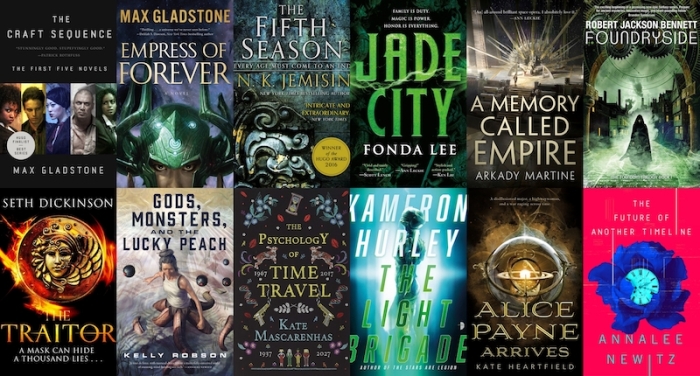
Do you have any other projects in the pipeline, and what are you working on at the moment?
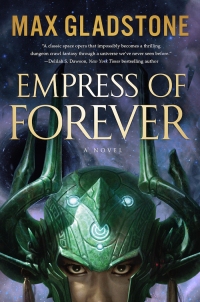 MG: Tons! Um, none of which I’m actually allowed to talk about at the moment. That said, I have another book out this summer: Empress of Forever, a no-holds-barred misfits-and-geniuses-against-the-universe novel.
MG: Tons! Um, none of which I’m actually allowed to talk about at the moment. That said, I have another book out this summer: Empress of Forever, a no-holds-barred misfits-and-geniuses-against-the-universe novel.
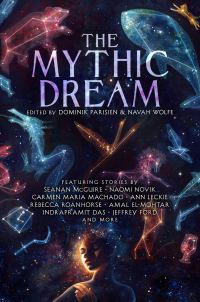 AE: IT’S SO GOOD! AUGH! I love it so much! ZANJ! VIV! Seriously, every single one of you needs to read Empress of Forever right now, it is already out, please do yourselves this tremendous favour!
AE: IT’S SO GOOD! AUGH! I love it so much! ZANJ! VIV! Seriously, every single one of you needs to read Empress of Forever right now, it is already out, please do yourselves this tremendous favour!
For my part I have a story coming out in The Mythic Dream, the third (and sadly final) anthology jointly edited by Navah Wolfe and Dominik Parisien. The story’s called “Florilegia,” and it’s yet another take on the Blodeuwedd story, more adult than “The Truth About Owls.” I just can’t seem to let that story go.
And of course, Max and I are both working on writing the pilot script for a TV adaptation of Time War — fingers crossed!
What are you reading at the moment (fiction, non-fiction)?
AE: I just finished reading Chuck Wendig’s Wanderers, which is great, but made me extremely miserable in how thoroughly and effectively it depicted white supremacists and their enablers; next up is Silvia Moreno-Garcia’s Gods of Jade and Shadow, which I’m very excited about. On the non-fiction side I’ve been reading Kevin Pask’s excellent The Fairy Way of Writing, tracing a fairy lineage from Shakespeare through to the 20th century. It’s wonderful, both for its content and for being an academic book that’s beautifully, movingly written.
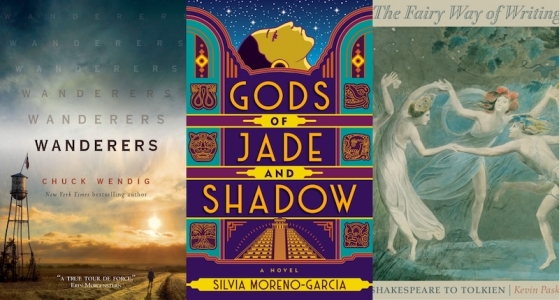
MG: David Graeber’s Utopia of Rules, which is a great deal more of a book of SFF criticism and analysis than I expected! And Beyond the Empire, the last book of K.B. Wagers’ Indranan War trilogy.
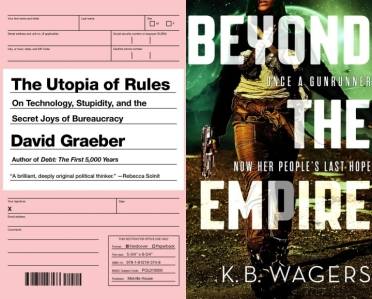
If you could recommend only one novel or book to someone, what would it be?
AE: Travel Light by Naomi Mitchison. It’s so important to me that we literally snuck it into the novella!
MG: The Game of Kings, by Dorothy Dunnett. It would keep them busy for a while. Alternatively, Middlemarch.
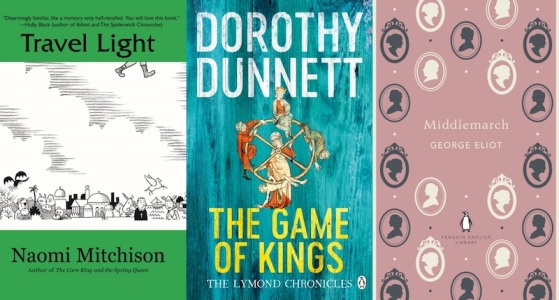
What’s something readers might be surprised to learn about you?
AE: I took two semesters of Welsh language courses in uni and still yearn after learning more.
MG: Who knows what would surprise my readers at this point!
What are you most looking forward to in the next twelve months?
AE: I genuinely can’t wait until this book comes out — and I’m especially excited that I’ll have the opportunity to do some events in the UK in support of its launch. I’ve been waiting to share Red and Blue with the world for two and a half years!
MG: Me, too!
*
Amal El-Mohtar and Max Gladstone’s This is How You Lose the Time War is out now, published by Jo Fletcher Books in the UK, and Saga Press in North America.
Follow the Author (El-Mohtar): Website, Goodreads, Twitter
Follow the Author (Gladstone): Website, Goodreads, Twitter
